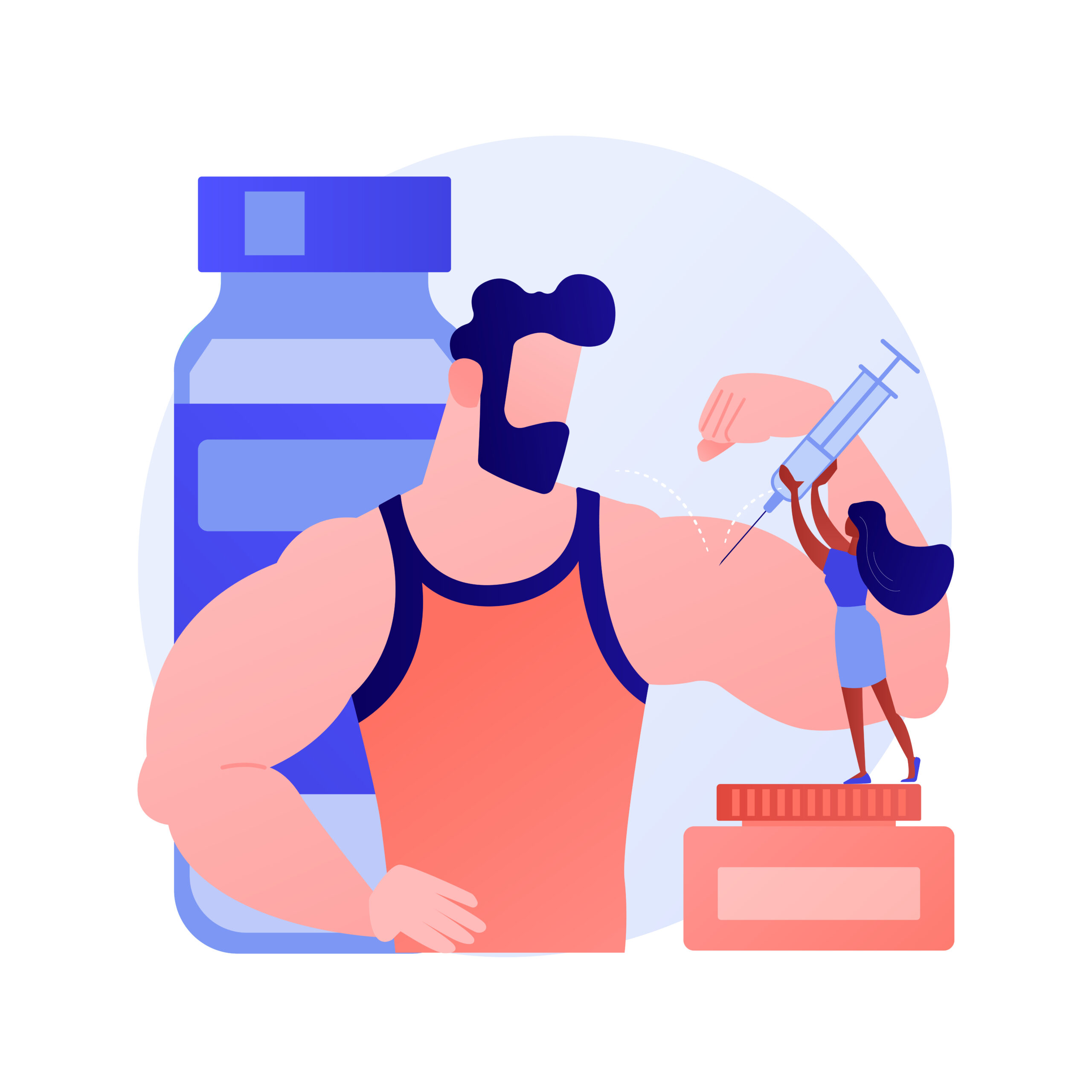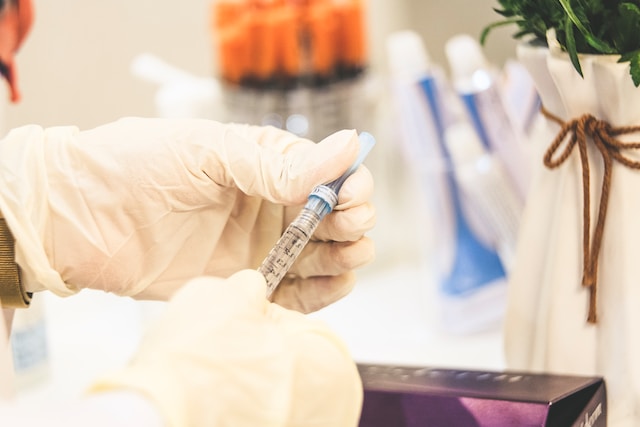Anabolic steroids are synthetic variants of testosterone that promote muscle growth, while corticosteroids are anti-inflammatory drugs used to treat various medical conditions.
TL;DR Anabolic Steroids Vs. Corticosteroids
Anabolic steroids are synthetic substances that mimic testosterone, used to enhance muscle growth and performance. They carry risks like cardiovascular issues and hormonal imbalances. Corticosteroids, on the other hand, are anti-inflammatory drugs used to treat various conditions. They have benefits such as reducing inflammation but can also have side effects. Stopping anabolic steroid use should be done under medical guidance. Corticosteroids are prescribed for medical purposes. Both types of steroids have pros and cons, and their use should be carefully considered.
Anabolic Steroids

Anabolic steroids, often associated with athletes and bodybuilders, are synthetic substances that mimic the effects of testosterone in the body. These performance-enhancing drugs work by increasing muscle mass and strength. While some individuals may be tempted to use anabolic steroids to achieve their desired physique or athletic goals, it’s important to understand both the potential benefits and risks involved.
One of the primary advantages of using anabolic steroids is their ability to promote muscle growth at an accelerated rate. This can lead to increased strength and improved athletic performance. Additionally, these substances may aid in reducing recovery time between workouts, allowing individuals to train harder and more frequently.
However, it’s crucial to recognize that there are also significant risks associated with using anabolic steroids. Prolonged use can disrupt hormone production in the body, leading to a range of adverse effects such as acne, hair loss, liver damage, cardiovascular problems, mood swings, aggression, and infertility.
Corticosteroids
Corticosteroids are a class of anti-inflammatory medications that mimic the effects of naturally occurring hormones in the body. They are commonly used to reduce inflammation, suppress the immune system, and manage conditions like allergies, asthma, autoimmune disorders, and skin conditions. Corticosteroids have different formulations, including oral tablets, inhalers, creams, and injections, and they work by reducing inflammation and suppressing the immune response. It’s important to use corticosteroids under medical supervision, as prolonged or excessive use can lead to potential side effects.
Anabolic Steroids Vs. Corticosteroids – Key differences
| Anabolic Steroids | Corticosteroids | |
|---|---|---|
| Purpose | Promote muscle growth and enhance performance | Reduce inflammation and suppress immune response |
| Medical Use | Limited medical use, such as hormone replacement therapy | Widely used in various medical conditions |
| Origin | Synthetic derivatives of testosterone | Mimic naturally occurring hormones |
| Effects | Increase muscle mass, strength, and performance | Reduce inflammation, relieve symptoms |
| Side Effects | Hormonal imbalances, liver damage, cardiovascular issues | Increased risk of infections, bone loss, mood changes |
| Abuse Potential | Abused for performance-enhancing purposes | Not typically abused for performance enhancement |
| Legality | Controlled substances in many countries | Widely available with prescription |
| Medical Supervision | Often used without medical supervision | Generally used under medical guidance |
Pros and Cons of Using Anabolic Steroids
Pros of using anabolic steroids
- Increased muscle mass: Anabolic steroids can promote muscle growth and development, leading to increased strength and physical performance.
- Enhanced athletic performance: Some individuals use anabolic steroids to improve their athletic abilities, including speed, power, and endurance.
- Injury recovery: Anabolic steroids may aid in the recovery process from certain injuries by promoting muscle tissue repair and reducing inflammation.
Cons of using anabolic steroids:
- Health risks: Prolonged use of anabolic steroids can lead to serious health complications such as cardiovascular problems, liver damage, hormonal imbalances, and negative effects on cholesterol levels.
- Legal issues: Non-medical use of anabolic steroids is illegal in many countries, and possessing or distributing them without a prescription can result in legal consequences.
- Side effects: Anabolic steroids can cause a range of side effects, including acne, hair loss, aggression, mood swings, reproductive issues, and potential addiction or dependency.
- Hormonal imbalances: Anabolic steroids can disrupt the body’s natural hormone production, leading to imbalances and potential long-term consequences.
- Negative psychological effects: Some individuals may experience mood swings, irritability, aggression, and psychological dependence when using anabolic steroids.
It’s important to note that the use of anabolic steroids should only be undertaken under the guidance of medical professionals for legitimate medical purposes. Non-medical use of these substances carries significant risks and is discouraged.
Benefits and Risks of Using Corticosteroids
Benefits of using corticosteroids:
- Anti-inflammatory effects: Corticosteroids are highly effective in reducing inflammation, making them valuable in the treatment of various inflammatory conditions, such as asthma, allergies, arthritis, and skin disorders.
- Immune suppression: Corticosteroids can suppress an overactive immune response, making them beneficial for managing autoimmune diseases and preventing organ rejection in transplant recipients.
- Rapid symptom relief: Corticosteroids provide quick relief from symptoms associated with inflammatory conditions, such as pain, swelling, itching, and breathing difficulties.
- Versatility: Corticosteroids are available in various formulations (oral, inhalers, creams, injections) and can be tailored to specific needs and targeted to specific areas of the body.
Risks of using corticosteroids:
- Adverse effects on bone health: Long-term use of corticosteroids can lead to decreased bone density, increasing the risk of osteoporosis and fractures.
- Suppression of the immune system: While immune suppression can be beneficial in certain situations, it also increases the risk of infections and delays healing.
- Hormonal imbalance: Prolonged use of corticosteroids can disrupt the natural hormonal balance in the body, leading to potential issues like adrenal insufficiency or Cushing’s syndrome.
- Glaucoma and cataracts: Corticosteroid use, particularly in high doses or for extended periods, can increase the risk of eye conditions such as glaucoma and cataracts.
- Withdrawal symptoms: Abruptly stopping or tapering off corticosteroids after long-term use can result in withdrawal symptoms and adrenal insufficiency.
It’s important to note that corticosteroids should only be used under medical supervision, with careful consideration of the benefits and risks. The dosage and duration of use should be determined by healthcare professionals to minimize potential side effects.
What Are Anabolic Steroids Used For?
- Hormone Replacement Therapy (HRT)
- Counteracting muscle loss in certain medical conditions
- Stimulating puberty in cases of delayed puberty
- Treating anemia by enhancing red blood cell production
- Addressing osteoporosis in some cases
Side Effects of Anabolic Steroids
- Hormonal Imbalances: Disruption of natural hormone production.
- Cardiovascular Issues: Increased risk of heart disease and high blood pressure.
- Liver Damage: Potential liver toxicity and dysfunction.
- Psychological Effects: Mood swings, aggression, and potential dependency.
- Reproductive Issues: Reduced fertility, testicular shrinkage, and hormonal imbalances.
Long term risks of using Anabolic Steroids
- Cardiovascular complications
- Liver damage
- Hormonal imbalances
- Musculoskeletal issues
- Psychological effects
How to stop using Anabolic Steroids
Stopping the use of anabolic steroids should be done with careful consideration and under the guidance of healthcare professionals. Here are some general steps to help stop using anabolic steroids:
Consult a healthcare professional: Discuss your desire to stop using anabolic steroids with a healthcare provider who can guide you through the process and provide appropriate support.
Gradually taper off: Abruptly stopping steroid use can lead to withdrawal symptoms. It is usually recommended to gradually reduce the dosage over time to minimize potential withdrawal effects.
Seek emotional support: Discontinuing steroid use may come with emotional challenges. Consider seeking support from a therapist, counselor, or support group to address any psychological aspects and help cope with the transition.
Focus on healthy lifestyle habits: Adopt a balanced diet, engage in regular exercise, and prioritize rest and recovery. This can aid in recovering natural hormone production, maintaining physical well-being, and replacing the desire to rely on anabolic steroids.
Monitor health: Regularly follow up with healthcare professionals to monitor any potential health changes or complications associated with the use and discontinuation of anabolic steroids.
It’s important to note that the process of stopping anabolic steroid use may vary depending on individual circumstances, and it is crucial to consult with healthcare professionals for personalized guidance and support throughout the discontinuation process.
DISCLAIMER: This article is intended for informational purposes only and does not substitute professional medical advice. Always consult a healthcare provider before making any decisions regarding medication usage.
Image Credits
Featured Image By – Sam Moghadam Khamseh on Unsplash
Image 1 By –
Image 2 By – vectorjuice on Freepik









